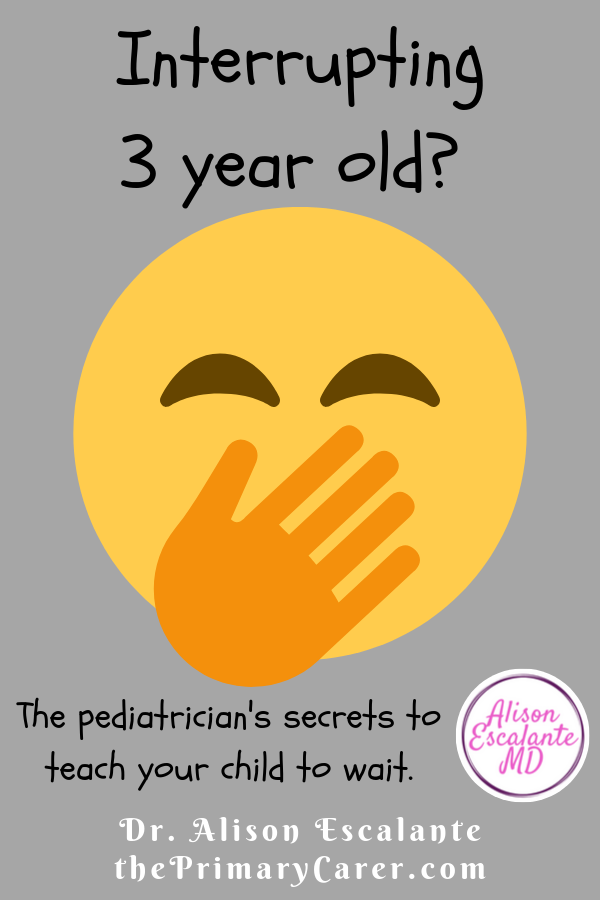“Recently (in the last 2-3 months) my 3 year old son has become very vocal and insistent on being heard. Particularly when I’m in the room. If I’m trying to talk to anyone he starts holding a separate conversation and then shouts ‘I’m trying to talk!’ How can I honor him but still be able to have conversations with other adults???” This question came from one of the moms in our Should-Free Parenting facebook group, and it echoed something I hear a lot.
3-year-olds embarrass a lot of parents in my office. They interrupt us, they mess with all the medical equipment, and the more often we stop the conversation to correct them, the more they do it. There is no doubt: the interrupting three-year-old is one of the most frequent problems parents ask me about.

As I considered what I might say to answer this mother’s question, I wondered what she had already tried. What had she done so far when her child interrupts her? “So far gentle reminders that I’m speaking with someone else and then trying to come back to him. I say ‘try,’ because the reminders are done a few times in the same conversation. I haven’t really tried ignoring him because it’s pretty impossible to ignore.”
It’s impossible to ignore.
When I think about children who interrupt, this mother has hit the nail right on the head. “It’s impossible to ignore.” That’s right! Because our kids make sure we can’t ignore them!
But the good news is that she can be comforted because this is completely normal behavior for a 3-year-old. In fact, it’s so normal, that is something I deal with every day in the office. So many parents come into that office visit worried that I’m going to judge them. It’s obvious in their body language that they’re worried I’m going to think they’re a bad parent. This is even harder for parents of kids who usually behave, because the moment they get in the room with a doctor, their behavior changes completely.
Very often, children are lovely when I first walk in and we chat about what they are interested in. In other words, kids are great when they have their pediatricians full attention. But the moment I have to turn to their parents and have the adult conversation to do the real work of the visit, the child will now do everything they can to get that attention back.
When children are ignored, they:
- Pull on our legs.
- Mess around in the drawers.
- Squeeze and yank the blood pressure cuff.
- Sing or whine loudly.
- Say “Mom, mom, mom, mom, mom…” or “Dad, dad, dad, dad, dad.”
- Try to eat the medical equipment.
- Pull the paper off the exam table.
- Open and slam the room door.
- Open the exam room door and run down the hallway.
- And my personal favorite: if they cannot get our attention any other way, they invent a potty emergency.

The potty emergency is the best example I know of just how smart our children really are. First time parents fall for it every time, interrupting our whole doctor visit to run down the hall to go to the potty. That’s when they find that their child takes a great deal of time sitting on the potty and not going at all, or having a little drip. Why? Because they didn’t really have to go to the potty. They wanted our attention.
Our kids insist on our attention. Does that make them selfish?
Does this mean that all these 3-year-olds are horrible, selfish people? Of course not. For instance, in order to learn to share, they must first understand what it is to possess something. Only after they know what if feels like to have ownership, can they truly understand what it means to give. Our 2 and 3-year-olds have to understand the desire to connect with us and to have our attention before they can control it. That’s how child development works: desire comes first and self-control is built later… slowly.
3-year-olds want it all and they want it now. Truthfully, aren’t we all a little bit like that? Have we really stopped wanting like that? Or have we learned how to regulate that desire?
When I asked myself that question, I suddenly realized that I may have ended up with a 3-year-olds’ ideal job. For example, in the vast majority of my day-to-day conversations, I’m the one who people are paying attention to. In fact, that’s why people come to see the pediatrician: because they want my attention and thought and they are paying close attention to me in exchange. I hadn’t realized this until I thought about this mother’s question.
It’s a good thing I’m not a 3-year-old, or I’d be a pretty terrible doctor. For instance, I need to be able to understand when to stop everything and listen, when to let someone else take control of the conversation. Growing up in our desire for attention means learning what it is to share the leadership and attention in a conversation.
If your child interrupts, it could be a sign of something you’ve done well.
What if the reason our kids interrupt far more now than we did when we were kids is for a good reason? It’s true, we don’t punish kids now the way we might have been for interrupting. But is that the only reason? I wonder if it’s because we play with them more and are such engaged parents. They want our attention because our attention is fun, and that’s a wonderful thing.
What do we do when our child interrupts?
For just a moment, let’s consider our goal for our kids. We want them to grow up to be individuals who can operate well in society, who people will like. Parents of interrupting 3-year-olds worry they are raising little attention seekers. They are absolutely right, because three year olds never stopped trying to get the full attention. They are ravenous for it, they never seem satisfied.

So when we look at this behavior and what to do about it, we have two questions and two goals.
- How do I stop the behavior now?
- How do I train my child over the long term so they can have a successful future life?
Regarding stopping interrupting in the moment, I honestly do not have a good answer. Older methods of parenting worked better for this. The rule was that kids were to be seen and not heard, that they mattered less than adults. When they broke this rule, they were punished. If you scare a child or you threaten corporal punishment, they’re more likely to be quiet. If you shame the child, they are much more likely to comply.
However, there is a lot of very good science to show that corporal punishment has negative effects for kids. This is also true for using words that shame our kids for their behavior. And even if it didn’t, it doesn’t really meet our long term goals.
Our goals for our kids.
- To raise happy, healthy adults who are confident in themselves.
- To raise adults who have good character and are respectful of others.
Sometimes parents ask me if it might be good to teach children that they are to be seen and not heard again. That’s just not going to work, because we just don’t believe that anymore. In fact, we see them as a tremendous source of joy and delight in our lives. And one of the best things about our generation of parents is that we recognize our children’s individual person-hood and rights. So old school methods don’t work anymore, because we’re not old school.

When we look at our methods, we have to consider whether they truly are effective for getting to our goals. If we want confident adults, we can’t use discipline that tears down that confidence. Or as the mother who wrote in put it best, “How can I honor him but still be able to have conversations with other adults?”
What are new school methods that we can use?
One option is the quick and dirty solution. Sometimes, we really need to get through the doctor’s visit, and the 3-year-old just can’t do it. That’s when I encourage parents to turn on YouTube. Oh, yes. Because sometimes you just have to get through a situation. But distracting them with YouTube is not going to solve the problem long term. Here are some options that build their ability to wait for our attention over the long term:
- Get down at their level, look them right in the eye, put your finger on their lips. Then say, “I need you to wait to talk.”
- Model waiting yourself (within reason). Point out what you are doing. “I just waited until she finished what she was saying.”
- Use an aspirational statement, “You’re the kind of kid that likes to listen to what other people are saying before you talk.” or “You are the kind of kid who waits your turn to talk.” Statements like these tell kids we believe in them and makes them want to be that person.
- Give them a sense for when it’s going to be their turn. Say, “I will tell you when it’s your turn to talk.”
- In a calm moment, send the message that waiting our turn to speak or play is a way to show love or respect. Ask them to think about how they can show respect in a given situation?
However, that last suggestion is tricky. We need to be careful not to turn that into a manipulative or shaming concept. We want to avoid saying things like “If you love mommy, you will keep quiet.”
It’s takes years to teach a child not to interrupt.
Now here’s the unpleasant truth. My husband and I went through years while the kids were young, when we felt like we never completed a sentence to each other. Then, by the time the kids were finally in bed, we were too exhausted to even try. This is the reality of having young kids and it’s not your fault. Unfortunately, there’s not going to be any trick or tip or trick that’s going to fix that. This is a progressive project of coaching our kids over time.

However, there is one key thing we do that will undermine all our efforts: get upset about it. Sure, we all do in moments. But if we can use these techniques without infusing them with our frustration, they will work so much better. When we express them with irritability, our kids can’t learn our message because are hearing a louder one. Our emotion comes through louder and that’s what they notice. Our frustration tells them they are annoying, or they can’t do this.
Our teaching works so much better when it comes along with the message, “I believe in you, I am willing to stay in this with you and be patient with you, and I know you can do this.”
I’m just too frustrated to do this calmly.
Pediatricians call them three-nagers for a reason. They are some of the most irritating human beings on the planet, and they are some of the most adorable ones at the same time. If you know that training them not to interrupt is only going to work if you’re able to stay calm, how do you do that?

When your child is driving you crazy, Sigh, See and Start. That’s right, it’s time to see how the 3S method can help us under pressure. So, when your 3-year-old won’t stop interrupting, Sigh. Just sigh. Then See your child, see their body language, see the situation as it is. Then, and only then, Start. Start trying one of the options I’ve suggested. Start making the executive decision to put on YouTube and work on this at a less pressured time. Start doing something you thought of yourself. Whatever you do, most importantly, Start with an eye on your long term goals for your child.
We want an answer now, but this is going to be a long term solution. Because over the long term, kids really do learn these things from us. In reality, at ages 2 and 3 they test the same thing over and over and over and over again. That means we are going to need to give these messages again and again and again and again. That’s how they learn. There’s only so much you can do with a 3-year-old; it’s get’s much easier once they are 4 or 5.
One last thought.
The attention and interrupting issue is a lot like the sharing issue that is so key at age three. So let’s try talking with them about how we can be generous with our listening and talking, just like we talk to them all the time about sharing their toys. It may be one big mistake we are making as a generation of parents: that we teach them generosity with sharing their toys, but not with their listening and talking. I believe it’s time to change that.
Remember, there’s nothing wrong with the desire to have a conversation, to get the attention of the other people in the room and enjoy that social interaction. It’s not really because they’re selfish that they do this. It’s because they want to be a part of things. Isn’t that one of the best things about us as humans? We want to guide them and coach them without squashing that. Because deep down, aren’t we all three year olds? Don’t we all really want to be a part of the conversations, especially the important conversations like when the parent and the doctor are talking?
Do you have questions for Dr. Alison? She might have answered them in her blog, or in her column for Psychology Today. Or, you can join our community of parents on facebook and explore Should-Free Parenting with us. Learn more about how to really use the 3S method by watching Dr. Alison’s TEDx talk:
©Alison Escalante MD
Disclaimer: This article represents general education and does not constitute medical advice. My ideas are mine alone.


Excellent post. Thank you. 🙂
This is something that I really struggle with. My 4 year old constantly battles for my attention when I’m talking to my husband or friends. I want to be able to teach her patience but at the same time I don’t want to her to feel like I’m ignoring her or I don’t care about what she has to say. Just knowing that its something every parent deals with and its actually a positive thing is really helpful for the times when I find myself getting frustrated.